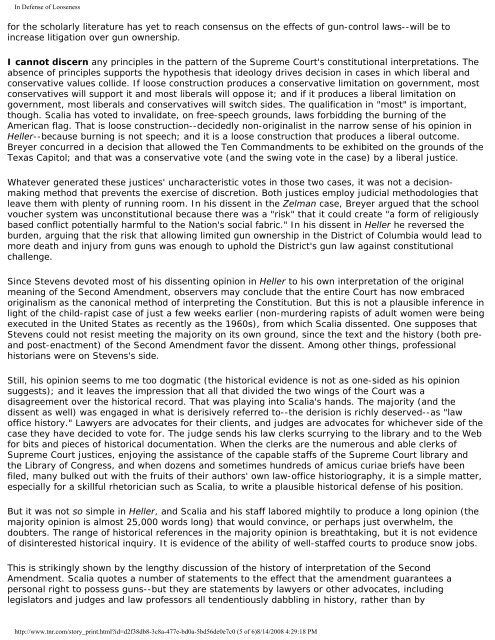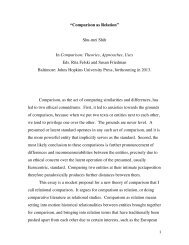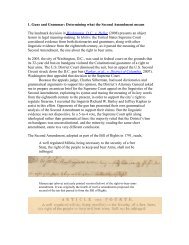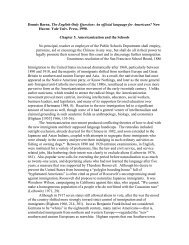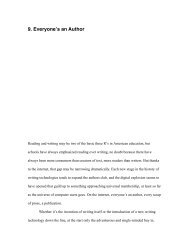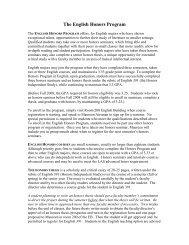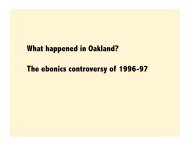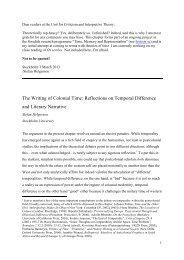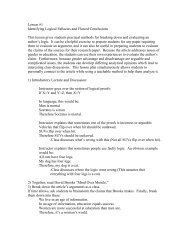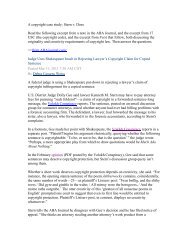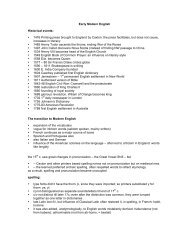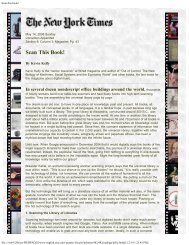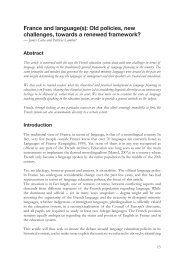Richard Posner: In Defense of Looseness - English
Richard Posner: In Defense of Looseness - English
Richard Posner: In Defense of Looseness - English
Create successful ePaper yourself
Turn your PDF publications into a flip-book with our unique Google optimized e-Paper software.
<strong>In</strong> <strong>Defense</strong> <strong>of</strong> <strong>Looseness</strong>for the scholarly literature has yet to reach consensus on the effects <strong>of</strong> gun-control laws--will be toincrease litigation over gun ownership.I cannot discern any principles in the pattern <strong>of</strong> the Supreme Court's constitutional interpretations. Theabsence <strong>of</strong> principles supports the hypothesis that ideology drives decision in cases in which liberal andconservative values collide. If loose construction produces a conservative limitation on government, mostconservatives will support it and most liberals will oppose it; and if it produces a liberal limitation ongovernment, most liberals and conservatives will switch sides. The qualification in "most" is important,though. Scalia has voted to invalidate, on free-speech grounds, laws forbidding the burning <strong>of</strong> theAmerican flag. That is loose construction--decidedly non-originalist in the narrow sense <strong>of</strong> his opinion inHeller--because burning is not speech; and it is a loose construction that produces a liberal outcome.Breyer concurred in a decision that allowed the Ten Commandments to be exhibited on the grounds <strong>of</strong> theTexas Capitol; and that was a conservative vote (and the swing vote in the case) by a liberal justice.Whatever generated these justices' uncharacteristic votes in those two cases, it was not a decisionmakingmethod that prevents the exercise <strong>of</strong> discretion. Both justices employ judicial methodologies thatleave them with plenty <strong>of</strong> running room. <strong>In</strong> his dissent in the Zelman case, Breyer argued that the schoolvoucher system was unconstitutional because there was a "risk" that it could create "a form <strong>of</strong> religiouslybased conflict potentially harmful to the Nation's social fabric." <strong>In</strong> his dissent in Heller he reversed theburden, arguing that the risk that allowing limited gun ownership in the District <strong>of</strong> Columbia would lead tomore death and injury from guns was enough to uphold the District's gun law against constitutionalchallenge.Since Stevens devoted most <strong>of</strong> his dissenting opinion in Heller to his own interpretation <strong>of</strong> the originalmeaning <strong>of</strong> the Second Amendment, observers may conclude that the entire Court has now embracedoriginalism as the canonical method <strong>of</strong> interpreting the Constitution. But this is not a plausible inference inlight <strong>of</strong> the child-rapist case <strong>of</strong> just a few weeks earlier (non-murdering rapists <strong>of</strong> adult women were beingexecuted in the United States as recently as the 1960s), from which Scalia dissented. One supposes thatStevens could not resist meeting the majority on its own ground, since the text and the history (both preandpost-enactment) <strong>of</strong> the Second Amendment favor the dissent. Among other things, pr<strong>of</strong>essionalhistorians were on Stevens's side.Still, his opinion seems to me too dogmatic (the historical evidence is not as one-sided as his opinionsuggests); and it leaves the impression that all that divided the two wings <strong>of</strong> the Court was adisagreement over the historical record. That was playing into Scalia's hands. The majority (and thedissent as well) was engaged in what is derisively referred to--the derision is richly deserved--as "law<strong>of</strong>fice history." Lawyers are advocates for their clients, and judges are advocates for whichever side <strong>of</strong> thecase they have decided to vote for. The judge sends his law clerks scurrying to the library and to the Webfor bits and pieces <strong>of</strong> historical documentation. When the clerks are the numerous and able clerks <strong>of</strong>Supreme Court justices, enjoying the assistance <strong>of</strong> the capable staffs <strong>of</strong> the Supreme Court library andthe Library <strong>of</strong> Congress, and when dozens and sometimes hundreds <strong>of</strong> amicus curiae briefs have beenfiled, many bulked out with the fruits <strong>of</strong> their authors' own law-<strong>of</strong>fice historiography, it is a simple matter,especially for a skillful rhetorician such as Scalia, to write a plausible historical defense <strong>of</strong> his position.But it was not so simple in Heller, and Scalia and his staff labored mightily to produce a long opinion (themajority opinion is almost 25,000 words long) that would convince, or perhaps just overwhelm, thedoubters. The range <strong>of</strong> historical references in the majority opinion is breathtaking, but it is not evidence<strong>of</strong> disinterested historical inquiry. It is evidence <strong>of</strong> the ability <strong>of</strong> well-staffed courts to produce snow jobs.This is strikingly shown by the lengthy discussion <strong>of</strong> the history <strong>of</strong> interpretation <strong>of</strong> the SecondAmendment. Scalia quotes a number <strong>of</strong> statements to the effect that the amendment guarantees apersonal right to possess guns--but they are statements by lawyers or other advocates, includinglegislators and judges and law pr<strong>of</strong>essors all tendentiously dabbling in history, rather than byhttp://www.tnr.com/story_print.html?id=d2f38db8-3c8a-477e-bd0a-5bd56de0e7c0 (5 <strong>of</strong> 6)8/14/2008 4:29:18 PM


